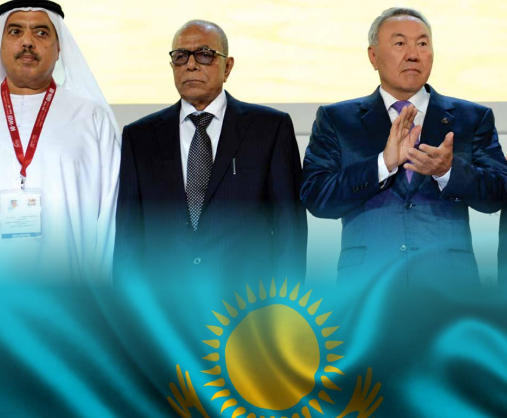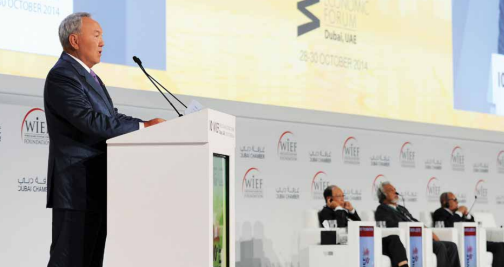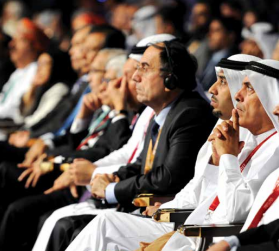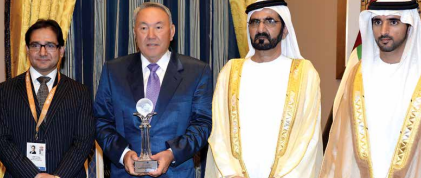

His Excellency Nursultan Nazarbayev -President Of The Republic Of Kazakhstan
Under your leadership, Kazakhstan has achieved a lot in terms of economic development, diplomacy and socio-political reforms. In this interview, however, we shall primarily focus on Islamic banking and finance (IBF).
During the years of the establishment of sovereign Kazakhstan in the global economic system, it has laid a solid foundation for its financial stability and economic security. Our country participates, actively enough, in the global economic and political processes, and is one of the initiators of the Eurasian and worldwide integration; our country has effectively chaired in such major international organisations as the Organisation for Security and Cooperation in Europe, Organisation of Islamic Cooperation, Shanghai Cooperation Organisation.
At the same time, in my opinion, one of the important objectives of Kazakhstan’s sovereign development is to form a well-balanced financial system in the country. In this regard, the effectiveness of the system should be backed by the real production process and secured by the tangible assets. In this case, the Islamic finance, which is directly related to the production process and demonstrates stability in the global economy, gains special importance.
I would like to note that I am really impressed by the rates of growth of the worldwide market of Islamic finance. Kazakhstan could not be out of such a dynamically developing trend. For my part, I have always given any kind of support to development of this industry.
Up to date, Kazakhstan has created a legal framework for the Islamic finance industry, and a number of Islamic financial institutions are operating in Kazakhstan and provide their services in the area of Islamic banking, insurance and leasing.
Moreover, Islamic securities – corporate sukuk – have also been issued in Kazakhstan.
Kazakhstan is a member of international Islamic financial organisations such as AAOIFI & IFSB. In May of the current year Almaty hosted, for the first time in the CIS and Central Asia, the 12th Summit of IFSB, which was attended by more than 150 delegates from different countries.
I think that we may say with confidence that Kazakhstan is a leader in the CIS and Central Asia in the legislative implementation of the Islamic finance principles.
Immediately after its independence, Kazakhstan not only decided to join the Organisation of Islamic Cooperation (OIC) but also to play a leadership role in it at least on the regional level. What was the vision behind this decision? And has this vision come into reality in the last 15 years?
In 1995 the Republic of Kazakhstan became a full member of the Organisation of Islamic Cooperation. Since then, on Kazakhstan’s cooperation with the OIC has been developing quite fruitfully, and the membership of our country in the Organisation has contributed to building effective relationships with the OIC member states, active participation of Kazakhstan in the political and economic processes in the Islamic world, and to attracting financial resources for implementation of the major investment projects in Kazakhstan.

Kazakhstan’s chairmanship in the OIC in 2011 was a remarkable benchmark in our cooperation. As part of that chairmanship, the practical results have been achieved in modernisation of the OIC activity. It was in Astana where the historic decision to rename the Organisation of Islamic Conference into the Organisation of Islamic Cooperation was made, which became an evidence of its transformation into a more effective international association.
The agreement has been reached to have more frequent meetings at the level of the heads of the OIC member states. For the first time in its history the OIC adopted the Action Plan for Cooperation with Central Asia.
At the same time, as a part of its chairmanship, Kazakhstan hosted the 7th World Islamic Economic Forum (WIEF), the 3rd Islamic Conference of Health Ministers, meeting of international experts on the development of the OIC water concept and international forum of religious scientists.
Due to Kazakhstan’s active position, its candidacy for membership in the Bureau of the General Assembly of the Standing Committee for Economic and Commercial Cooperation of the Organisation of the Islamic Conference (OIC COMCEC) was strongly supported.
Currently the work is carried out to establish a mutual food aid fund with the headquarters in Astana. Almaty’s recognition in 2015 as the capital of Islamic culture has become a powerful impetus to the expansion of humanitarian relations with the OIC member states.
The entire complex of the arrangements held within the framework of our cooperation has already produced the tangible results for the citizens of our country by contributing to expansion of trade with the Muslim countries and coming of Islamic investors, attraction of the financial resources and implementation of Islamic banking, promoting increase in the flow of tourists to our country, including by new air service to OIC countries, and mutual enrichment of the cultures.
OIC in its turn considers our country as the most important partner in economic cooperation and development of the Central Asian states and believes that Kazakhstan is quite able to become a bridge between the OIC member states and the these republics.
You have very cordial relationships with the President of Islamic Development Bank (IDB), Dr Ahmed Mohamed Ali, and other leaders in the Muslim world, like Dato’ Seri Najib Razak, Prime Minister of Malaysia. Given that the IDB and Malaysia have both played instrumental roles in the development of IBF, how has Kazakhstan leveraged on these special relationships to develop IBF domestically?

When implementing the issues of development of Islamic finance or any other industry, Kazakhstan is always open for dialogue and is ready to use the experience of the countries and organisations that have advanced in this area. Being a rather young country, we are building our own model of economic, political and cultural development. Today, Kazakhstan is the economic leader in Central Asia. And, of course, this achievement has been also due to our international partners.
IDB is one of the key strategic partners of Kazakhstan in development of the Islamic finance industry and banking. It should be noted that Kazakhstan is the country where one of four regional offices of IDB has been opened. In 2012, the Government of Kazakhstan and IDB signed the Country Partnership Strategy aimed at strengthening of cooperation as a part of the state program of the forced industrial-innovative development of the Republic of Kazakhstan.
IDB Group contributes to development of such sectors as transport, power industry, agriculture and also to development of the rural areas and non-primary sectors of industry, science and technology, diversification, financial sector and inter-regional cooperation.
The current portfolio of the projects financed by IDB and lines of financing allocated by IDB in Kazakhstan amount to about US$2 billion.
Currently, the National Bank of Kazakhstan is implementing the IDB grant to improve Kazakhstan’s legislation on Islamic finance.
Cooperation with the Islamic Corporation for the Development of the Private Sector (ICD) is affected on a permanent basis as a part of allocation of the SME financing lines, including the agricultural sector of our country, through the Islamic finance instruments. ICD has established first Islamic leasing company in Kazakhstan. The total funding of ICD in Kazakhstan is about US$ 250 million.
Speaking of the cooperation with Malaysia, I would like, first of all, to draw attention to the similarity in the variety of ethnic groups, interaction between religions, foreign policy and approaches to the economy.

Since 1992, Malaysia has been our reliable partner in different areas, such as power industry, oil and gas industry, construction, tourism, and education. In the recent years, we have strengthened our cooperation in the implementation of the Islamic finance instruments. The central banks of our countries are actively cooperating in promotion of the Islamic finance.
By the way, our first issuer of sukuk in the region – the Development Bank of Kazakhstan – has issued an Islamic bond, Sukuk al-Murabaha, for MYR240 million on the Malaysian stock market. The remarkable fact is that IDB acted as an anchor investor of this issue, which allowed placing more than 60% of the issue among foreign investors.
Thus, the Islamic finance represents an interconnected system, and we, as a part thereof, will cooperate with each other to develop the industry as a whole.
You became the fourth GIFA Laureate last year at the Global Islamic Finance Awards (GIFA) held in Dubai. This was indeed recognition of your efforts to promote IBF in Kazakhstan and consequently in the Central Asian region. What are your government’s plans to further strengthen IBF in the country?
Kazakhstan has proceeded to implementation of large-scale institutional reforms, including those aimed at further improving the investment climate in Kazakhstan. The detailed Plan of the Nation “100 Concrete Steps” has been already adopted for implementation of the institutional reforms. The Plan stipulates, inter alia, the development of Islamic finance.
In accordance with my instructions, the Government and National Bank of Kazakhstan are doing and have already done a lot of work for further improvement of the legal framework, development of the Islamic finance infrastructure, attraction of investors and financial market participants. I think that the issue of the sovereign sukuk by the Ministry of Finance in 2016 will become an important step for us.
The work in this direction will be carried out systematically, and we have set a goal for ourselves that by 2020 the total assets of Islamic banks will amount to 3 – 5% of the total assets of the banking sector. By 2025, we are planning that this indicator will reach 10%.
The implementation of those arrangements that we have determined will allow developing the Islamic finance market in Kazakhstan and provide people with additional funding opportunities and access to the banking products, and increase the inflow of investments.
Based on the leading practices in the field of the development of the Islamic financial services industry, we will offer to the world a Kazakhstan’s model of the development of Islamic finance.
You seem to have preference for a younger generation of leaders for developing a sustainable future of Kazakhstan. What was the thought process in bringing a younger generation of Kazakhs to lead different institutions of national significance?
Today Kazakhstani people are a young and dynamic nation. I see that a new generation of managers, civil servants, businessmen and public figures is emerging. This is a very talented and, I am sure, successful young generation.
Kazakhstan has created the most favourable conditions for education and self-improvement of our young citizens to ensure that once they become professionals they will be in demand in every corner of the globe, and will be able to ensure development, success, well-being and recognition of Kazakhstan in the XXI century.
During the years of independence, we have been consistently building up the human capital. We have trained abroad more than 10 thousand students under Bolashak program. This year Nazarbayev University, whose partners are the leading universities of the world, awarded diplomas to the first graduates.
Therefore, I am sure that our leading managers of absolutely new formation will demonstrate to the entire world the creativity, efficiency, being in demand and be able to implement the tasks set, with due consideration of the traditions of our people and the best global practices.
Can you kindly share with our readership your vision behind the newly announced Astana International Financial Centre.
Astana International Financial Centre (AIFC) will be a centre of attraction and a catalyst of investor capital, high corporate values and excellence.
Eventually AIFC will become the financial gateway to the very heart of Eurasia, with its rich natural resources.
Unique conditions that have no analogues in the vast expanses of the post-Soviet space will be created to attract international participants.
The system will be based on the English (case) law. The Financial Centre Court will become a key element to protect the investor rights. The Court will use the English language, and the cases will be considered by foreign judges having experience and authorised to consider investment disputes.
This will create appropriate tax incentives. Thus, tax exemption will be granted up to 50 years.
Coupled with the developed infrastructure and direct air links with the key financial capitals this will allow creating another strong link in the system of the global financial centres. Further development of the Eurasian Economic Union will only contribute to this end.
Islamic finance is one of the part of the AIFC development. The involvement of international Islamic financial market participants will significantly expand the range of Islamic financial instruments and services.
Overall, we expect a long-term positive effect of this initiative. The country will receive additional increase in GDP of more than 1% annually up to 2025 only from activities of AIFC.
In terms of the regional aspect, AIFC development will strengthen the tendency towards economic integration among the Eurasian countries, enhance the local competence and will contribute to the sustainable socio-economic development of the region.

There is only one Islamic bank operating in Kazakhstan at present. Are other Islamic banks being set up in the country? Why has the progress been slow?
Such important issue as the development of an alternative financial system should be implemented progressively, as it is necessary to understand, in which direction to move.
For example, this process in Malaysia and Turkey took about 30 years. The first steps in development of Islamic finance in London and Dubai that are positioning themselves today as the international Islamic financial centres were made about 40 years ago.
Up to date Kazakhstan has done a lot of work in terms of both creating a legal framework and attracting the participants. We use the best experience of the countries that have been developing Islamic finance for a long time, and we have determined the objectives for ourselves and are working to achieve these objectives.
The Government and the National Bank are working on further improvement of the current legislation and development of the Islamic finance infrastructure. Accordingly, it will take some time to open new financial institutions.
However, even today we see interest on part of investors with regard to possibility of opening Islamic banks.
In addition, Kazakhstan’s accession to WTO this year will have a positive impact on development of the Islamic finance market, as starting from 2020 the foreign banks, including Islamic banks, will be able to open their branches in Kazakhstan.
At the same time it should be noted that there is great potential for Islamic financial services, as there is growing demand for Islamic financial products, not only from Kazakhstan, but also from the CIS countries and Central Asia. Today, the number of Muslims in the region is more than 75 million.
By creating the necessary conditions and demonstrating a steady economic growth and attractiveness for foreign investors, we would like to emphasize that Kazakhstan is open and welcomes new members of the Islamic financial services industry.
As a GIFA Laureate, what message would you like to give to the leadership of global Islamic financial services industry?
I have set a task to revive the Great Silk Road and establish Kazakhstan as a uniform complex of hubs of the international level, including transport, logistics, tourism and financial hubs. The very history and geography of Kazakhstan presents a unique opportunity for dialogue between the Islamic and Western civilisations.
The image of the New Silk Road will allow all countries interested in the development of the Islamic financial services industry to unite around it, strengthen cooperation and implement the tasks set, and in the long run – to become a catalyst for the further development and advancement of Islamic finance in the world.
I invite all participants of the global Islamic financial services industry to join our efforts in revival of the Silk Road, by exploring possible ways of partnership, in order to commemorate the twenty-first century as the age of progress of the Islamic financial system.



